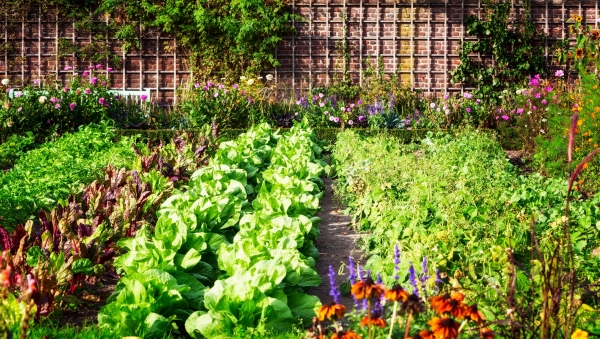Recognizing the Plentiful Harvest

Sermon for June 14, 2020
The Rev. Andria Skornik
About a year ago, my family moved into the place where we’re living now, and one of the unexpected perks was that the people who lived in the house before us were gardeners. This meant there were raised garden beds already set up and tomatoes and kale ready to pick. We got to enjoy all of these veggies throughout the summer, and we thought that was the end of it.
But this last winter, as we, like many people were compelled to get out and garden, we were shocked to find that there were onions, lettuces, greens, more kale... plants that had wintered over or that were planted before we got there. As a result, we got to be part of an amazing harvest we didn’t even know about. And it inspired us to do more work in the garden that we’re getting to see the fruit of now.
In a way, I wonder if that’s how it is with the harvest Jesus is talking about in today’s passage from Matthew. He says to his disciples, “The harvest is plentiful but the laborers are few.” Now traditionally, in Christianity, we’ve taken that to mean people going out and bringing people to church. But today, I want to offer another way of looking at it. Because my sense is that the harvest is so much more than just that. And we don’t want to miss these possible harvests happening right in our backyard, because we don’t know what we should be looking for.
We see this in today’s reading, where what prompted Jesus to say that the harvest was plentiful was not all of the people flocking to become his followers. But rather, when he looked out and saw a bunch of sad, helpless, directionless people. Anyone else might’ve looked at it and said “That’s a mess!” Or, “That’s a problem.” But Jesus looked at it and said, “That’s a harvest.” And his prayer was God to send people who would go out and respond to those needs.
The harvest is about all the work God is doing that God has invited us to co-labor in. We know the Holy Spirit is always out at work in the world. Moving in people’s hearts. Bringing things into alignment for people to thrive and creation to flourish. You might say it’s like God plants the good seeds, tills the soil, and gets everything in place so that the harvest is ready for reaping. And because God’s activity in the world is so vast, there’s no limit to what the harvest might be.
It could be what’s happening in our homes or neighborhoods, in houseless camps or in conversations about civic life. The harvest could be people needing healthcare, kids who need mentors, seniors who need groceries, or minority voices that need to be brought to the table.
But the question is can we recognize it? Can we see that these things that look like needs or problems even are actually fertile ground that we’re called to tend?
So then part of the work is in knowing what to look for. For Jesus it was seeing the people around him who were sick, hurting and needing help. And that was the harvest he sent his disciples to. We too can look at where people are in need and how we might respond.
I experienced this a few years back when I was trying to help with a children’s ministry at my church. I went in thinking what was needed was to get the parents more involved in volunteering and that that was the missing link. But in conversations with parents, I realized they were tired and had too much going on. So instead of asking them to do something else, we created some spaces where parents could come for support and community. We also spread out the work of the Children’s Ministry so that everyone in the parish took a Sunday, and it ended up bringing new life to the ministry. But in this case, helping out the parents ended up being the harvest.
Another way to find the harvest is to go where the energy is. Too many of us tend to see it as a burden. Another thing that we have to do. But if you’ve ever harvested in your own garden, you know it’s exciting to see that little broccoli floret. Or taste that first little ripe strawberry. It’s work, yes, but the kind that feels good to be doing. And the same goes for the places God is sending us out into. Because in doing it, you’re getting to bless people and make the world better.
The way it energizes you and those around is part of how you know you’re involved in the harvest.
Finally, we recognize the harvest when we see God’s will being done and when we see people being drawn to the things that God loves. Like across the country these last few weeks, we’ve seen people getting excited about justice. There are conversations addressing human rights failures or the lack of opportunity where the scales have been tipped and people asking what we do to change that. There were over 2,000 people gathered on our church parking lot and sidewalks, in a neighborhood effort to stand with Black Lives. In conversations happening in our local neighborhood associations and business groups there’s a focus around what we can be doing to help each other get through the next few months or years. This hunger for justice and care for the neighbor is so much like what we hear in the prophets. Like in Amos, where what God wants most is for justice to be established in the city. Or in Micah where God says what I really want is for you to be serving each other. Or in the laws where God commands the people to care for the neighbor and stranger. All things that Jesus affirmed as well. These impulses we are seeing towards compassion and justice — these are also a harvest.
We will find that the harvest is plentiful when we know what to look for. And when we see it, our role as the church is to say how do we support this? How do we join in what God is doing?
How do we invite more people to take part in the work? Because as we know, there’s always more of this good work to be done than there are people to do it. And the work is never over.
It’s a lifelong, every day commitment with each harvest getting us a little closer to the world God has planted in our hearts.
The more we are looking at where the needs are, where the energy is, where God’s will is being pursued, the more we’ll get to be part of some amazing harvest that we might not have known about, but that we definitely want to be part of.
Influential Sources
